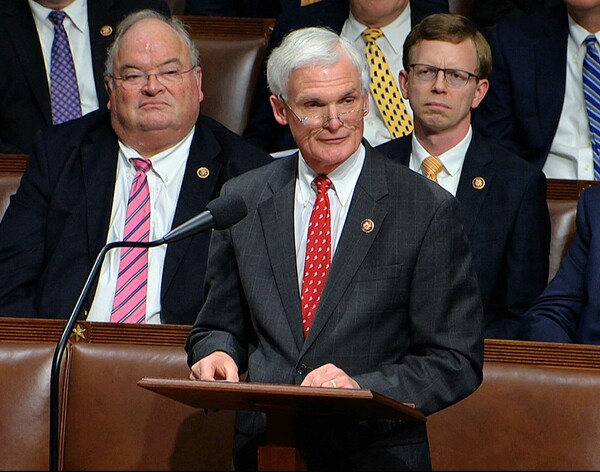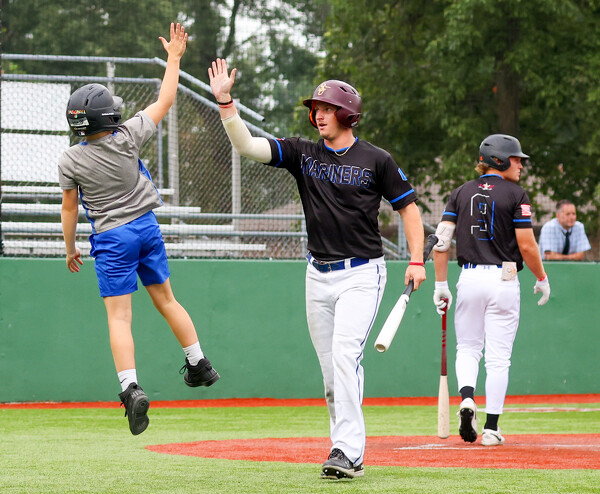CELINA - U.S. Rep. Bob Latta, R-Bowling Green, doesn't think President Joe Biden is fit to run the country another four years and appluads the Supreme Court's recent rulings on the Chevron decision and presidential immunity.
"People age differently," Latta told The Daily Standard last week while making the rounds in Ohio's 5th District. "In the last several years, he's unfortunately gone downhill. I said over a year and a half ago he won't be on the ballot in the fall."
Latta said he was appalled watching the presidential debate between Biden and former President Donald Trump.
"I can honestly say … I've never seen anything like it in my life," he said. "The president truly struggled and it was hard to watch somebody not be able to communicate."
He said although the televised event was uncomfortable to watch, he thought it was "good for the American people to have some clear markers out there and unfortunately see the president is just not up for the job."
The first general election debate on June 27 between Biden and Trump featured clashes on immigration and climate change and deeply personal attacks on each other.
Because of his performance where he stumbled over his words, Latta doesn't think Biden is up to the task for another term.
"I know that his family wants him to stay in, but his family shouldn't make a decision like that," Latta said. "I've thought for a year and a half that he would not be on the ballot in November because his condition is just not there."
On Monday, Biden stood firm against calls for him to drop his reelection candidacy by writing an open letter aiming to silence any skepticism.
Because of Biden's performance, many have speculated if he has any cognitive diseases. Despite this, press secretary Karine Jean-Pierre said Biden had undergone three neurological exams while in the White House as part of his annual physical exams - and no more - and said the president has not been diagnosed with or treated for Parkinson's.
Latta said he isn't qualified to speak on whether Biden has Alzheimer's disease because he isn't a medical doctor.
"(But) when you have family members - my dad had dementia and passed away at 96, my mother-in-law is 89 and has Alzheimer's - if you're around people, you see certain signs, and that's all I can say," Latta said.
To encourage younger politicians, Latta said age requirements could be an option, but "some people just age differently than other people. It all depends."
He said Ohio judges must retire at 70, but now, "we're finding is that too young? We just eliminated a lot of good people who can't serve. A lot of times it falls into how you set the parameter as to what's a proper age. That's a tough question."

U.S. Rep. Bob Latta, pictured in this file photo, spoke with The Daily Standard last week while in Celina.
Latta was optimistic of the court's ruling overturning a 1984 decision colloquially known as Chevron.
"The Chevron doctrine really is something that the Republicans in the House have been very concerned (about) for years," he said. "Under Chevron, what it said is that the courts would just defer to these agencies if they thought the law was unclear as to who had it. We're saying that Congress should make those decisions, not a federal agency."
The previous decision instructed lower courts to defer to federal agencies when laws passed by Congress are not crystal clear.
The 40-year-old decision has been the basis for upholding thousands of regulations by dozens of federal agencies, but has long been a target of conservatives and business groups who argue that it grants too much power to the executive branch, or what some critics call the administrative state.
With a closely divided Congress, presidential administrations have increasingly turned to federal regulation to implement policy changes. Federal rules impact virtually every aspect of everyday life, including food, cars and air quality regulations.
Those actions and others could be opened up to legal challenges if judges are allowed to discount or disregard the expertise of the executive-branch agencies that put them into place.
Latta said instead of educating judges on all aspects of multiple topics, it should be Congress' job to write better legislation, making it tighter and clearer than ever.
"We also then have to have that oversight of that legislation so we can make sure that when these agencies are doing it, that we can call them and say, 'No, you're not doing it. That was not our intent. You're totally off base.' They can't run off to the courts and say, 'Well, we want to do it this way, anyway,'" he said. "It's going to put the power back to Congress that I think has been advocated to the executive branch."
Latta was also pleased with the court's other landmark ruling in Trump's 2020 election interference case, granting former presidents absolute immunity from prosecution for official acts.
"What the court said was if it's an official act, you have immunity," he said. "I think that's important because what the courts pretty much said (is that) you can't have somebody as the chief executive of the country (in fear) every time they do something. They've got the separation of powers and I think they got that right."
The court's conservative majority said former presidents have absolute immunity from prosecution for official acts that fall within their "exclusive sphere of constitutional authority" and are presumptively entitled to immunity for all official acts. They do not enjoy immunity for unofficial, or private, actions.
"You can't beat somebody up or steal somebody's money or anything like that," Latta said. "That's not an official act. The court set parameters that (if it's in the president's) authority under Article II, (they're) protected."
Article II in the Constitution establishes the branches of government and defines the President's duties and powers.
"I think when people do read this, they're going to find out (it's) not just that protecting a person or a president - this is going to be something that's going to be far-reaching," Latta said. .
The dissenting justices said the majority decision makes presidents immune from prosecution for acts such as ordering Navy seals to assassinate a political rival, organizing a military coup to hold onto power or accepting a bribe in exchange for a pardon.
Latta thinks the dissenting opinions are outlandish.
Despite so much going on that could lead some to feel troubled about the nation's future, Latta said he is proud to be an American and serve his country.
"There's no other country on Earth like the United States," he said. "This is the place you have freedoms. This is the place where if you have dreams, you can make them a reality. We have people (who) come from other countries with nothing, work hard and all of a sudden, they accomplish great things because they could not do it where they came from."
Latta said the First Amendment is the bedrock of American freedom.
"One of the things that's great about this country is that you can say what's great about this country or there are some people out there (who) want to tear down," he said.
- The Associated Press contributed to this report.

